#Antigone type
Explore tagged Tumblr posts
Text
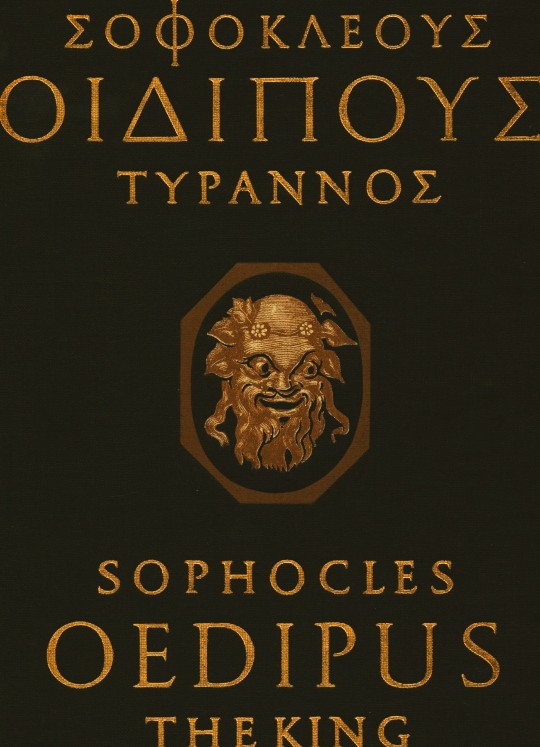
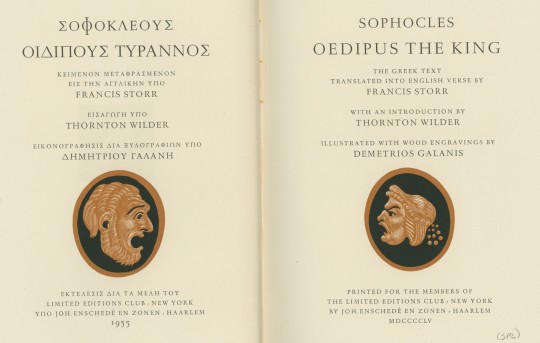
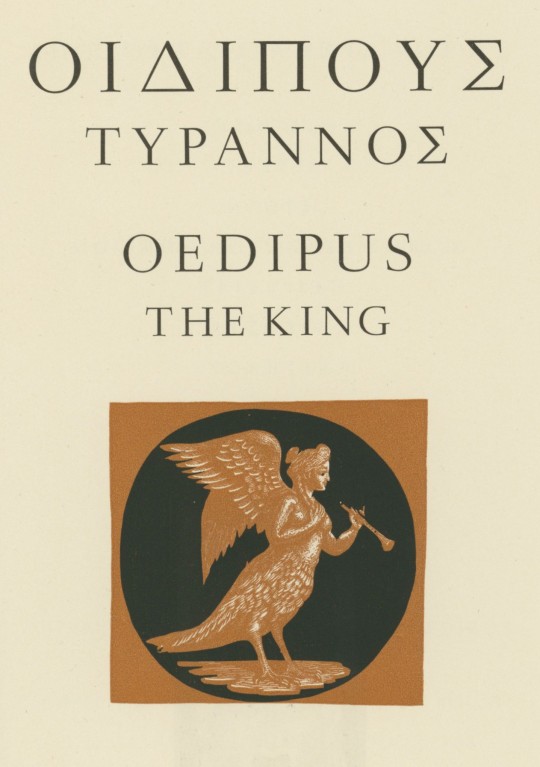


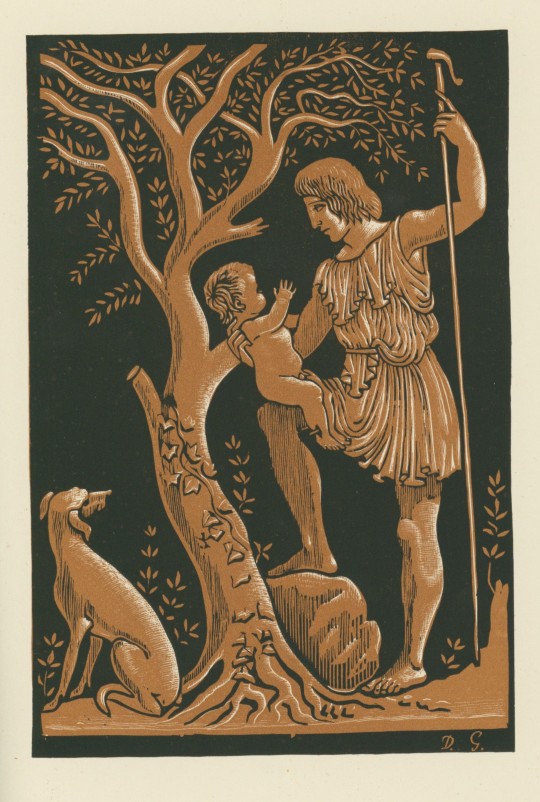
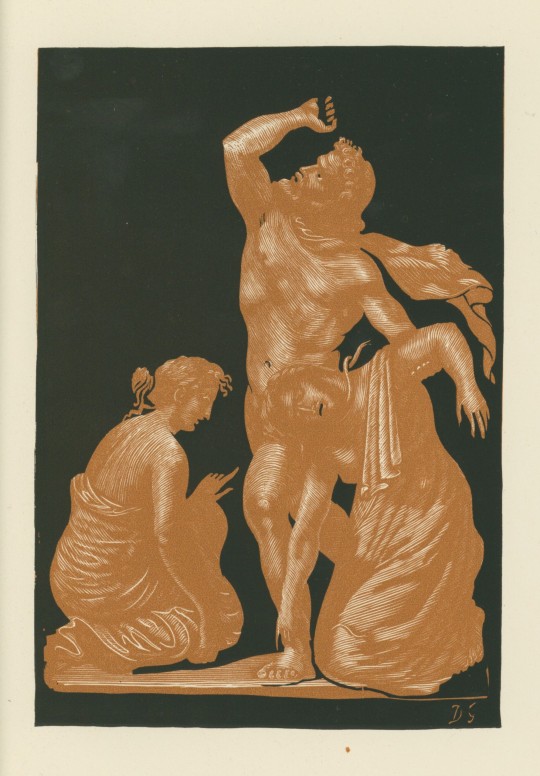

Tragically Greek
This 1955 edition of Oedipus the King, written by Sophocles, features the original Greek text alongside the English verse translation. Offering a rich, immersive reading experience results from hard work, dedication, and creative minds coming together to create this masterpiece.
Jan van Krimpen (1892-1958), Dutch typographer, book designer, and type designer, designed the two typefaces. The Greek type is named “Antigone,” and the English type is called “Romulus.” The translator for this work was Francis Storr (1839-1919), a British classicist, translator, and teacher.
The paper was specially manufactured at the historic Dutch Pannekoek Papermill, a mill with a rich history that unfortunately met its end in a fire in 1944. This exclusive feature adds a touch of rarity to your reading experience. Printed in the offices of Johannes Enschedé, under the supervision of Mijnheer van Krimpen, it was for the members of the Limited Editions Club.
Adding to the richness of this edition is the detailed and insightful introduction provided by Pulitzer Prize winner Thornton Wilder (1897-1975), American playwright, novelist, and native of Madison, WI. His esteemed perspective offers an enlightening preface to the classic tale.
The illustrations are black and terra-cotta wood engravings designed by Greek artist Demetrios Galanis (1879-1966). He was the trailblazer of modern Greek engraving and was once touted as one of the greatest living Greek artists at the time of the book’s release.
Sophocles (c. 497/496 – winter 406/405 BC) was an ancient Greek playwright born in Colonus near Athens. He is one of the three great tragedians of classical Athens, along with Aeschylus and Euripides. Sophocles wrote over 120 plays during his lifetime, although only seven have survived in their entirety. His works are characterized by their complex characters, well-crafted plots, and profound exploration of moral and philosophical themes.
Among his most famous plays is the tragedy Oedipus the King. The story is about Oedipus, the king of Thebes, who tries to uncover the truth behind a plague that has struck his city. In doing so, he discovers that he himself is responsible for the plague, having unknowingly killed his father and married his mother. The play delves into themes of fate, free will, and the consequences of one's actions.
-Melissa, Special Collections Classics Intern
View other Classics posts
#classics#sophocles#oedipus#oedipus rex#oedipus the king#greek mythology#greek#wood engraving#athens#tragedy#greek tragedy#ancient greece#oedipus complex#Limited Editions Club#Johannes Enschedé#Enschedé#Jan van Krimpen#Antigone type#Romulus type#Francis Storr#Demetrios Galanis#Pannekoek paper#LEC#Thornton Wilder#Melissa
62 notes
·
View notes
Note

tried to squish their names together
The "D" in Lloyd's name works well enough as the "A" in Antigone I think?
yoooo
CAN WE GET A RATING, SCHOLARS?
#sentences I never thought id ever type#antigone#lloyd garmadon#tagamemnon#ninjago#Tragedyshipping#Greek
100 notes
·
View notes
Text
wiat highschools actually do musicals??? what the hell how do schools have enough singers for that
#in my school the only plays are likeee the non singing type#the theatre kids did hamlet and antigone but ive never heard of fucking. cats#i've also never been to a performance but thats mainly cuz i was scared and didnt know anyone in theatre
4 notes
·
View notes
Text
the funniest thing about the weird spell that wooden overcoats and antigone in particular cast over me for months and months is that i would often rb funny little ironic posts about antigone (sophocles) from lit mutuals completely forgetting that everyone wasn't by default talking about a skeleton of a weird little woman. with a penchant for getting attacked by owls no less
#i just think that for a show with multiple owl attacks hypothetically it should stop being funny. but it doesnt#antigone <3333333333333333333333333333#the original wovercoats brainrot coincided w/ smth real in my life that had me in full UHHHHH???? crisis over the type of girl im into. so#too many dots to connect in my head#antigone funn
15 notes
·
View notes
Text
never never never in my life gonna be able to beat the weirdo theatre nerd allegations. its midnight and for the last few hours ive been (voluntarily of my own free will At No-One's Behest) doing some character research for the show we're working on (which at a certain level is Absolutely Necessary!! but at *this* level is Absolutely Not. lmfao)(and so... ik for a fact if i mention this in rehearsal tomorrow im gonna get a whole lotta blank stares ((or TERRIFIED looks from the freshmen wondering if they should be doing this much work lmao))
but anyway so about 10 minutes ago i found a fucking essay (just 9 pages out of this philological collection from the 60s) that just the idea behind the Very Simple title made me so excited i had to stand up at my desk to start reading it and fully forgot to sit back down until i realized i wanted to start TAKING NOTES..... WHICH I GENERALLY HATE DOING WHILE READING........ BUT IM TOO EXCITED AND DONT WANNA FORGET ANY OF IT.................. SO IM TAKING FUCKING NOTES
but anyway beyond tHAT the thing that actually made me pause to start typing this post though is the fact that just now, four pages in, this essay finally put something into place that ive been puzzling over in my head since i very first read the play which... made me happystim so hard i almost knocked myself out of my fucking chair. hdkdgsjfkfhdgskdgwrdjfk.
so yeah. never beating the nerd allegations. lmao
#''IT WOULD BE IMPOSSIBLE TO TIE THE PLAY DOWN TO ANY PARTICULAR CONTEMPORARY SITUATION'' ITS A THOUGHT EXPERIMENT ITS A THOUGHT EXPERIMENT#OF COURSE IT IS. IM JUST OBLIVIOUS. BUT. GWRRGDJDGRFDJKFRWRDGWRGDJSHKFRK IM GONNA EAT MY FUCKEN SCRIPT#ahem. hm. pardon.#its just my brain is full of lightning atm you see. because i am unwell about poetry and theatre and philosophy and this is. OUUGHHH#its like the universe decided that since this week was so weird and uncomfortable i deserved little a treat#and gave me smth to growling shake around in my head for the next several days like a fucking mental chew toy#we've been talking a lot in rehearsal about why this play why now why this version which is always important and great to do#but some of the things people have said made me internally go ''mmmmm. no. no i dont think thats correct but i cant decide why exactly''#& its bc theyre taking it as its supposed to be literal but !! these characters arent necessarily supposed to each be recognizable people !!#theyre here to QUESTION A THEORY#''THE GODS ARE NOT ON ANTIGONE'S SIDE. IS ANTIGONE (EXCEPT ACCIDENTALLY) ON THE GODS' SIDE?''#IM GONNA EXPLODE#anyway um .#thanks for coming to my ted talk lmao#ive literally been pacing as i type this bc im so . OURGHH. THEMES THEMES THEMES THEMES THEMES. GRRWAAUGHH.#kreon tag#<-*slaps the roof of him* oh i am gonna fit so many character choices into this bad boy#..........#i um . may be avoiding my homework#oops.#bee speaks
4 notes
·
View notes
Text
Antigone in the Amazon is (overall!!!!) incredibly incredibly incredibly good. Theatre is like high school football. The highs and lows.
#sorry it's just. antigone was so good ans last weeks thing was so bad (SO bad)#and antigone for the record was like 90% good 10% stuff i needed a dramaturg for#which usually i wouldn't even mention if its that type of ratio except that what was bad was very much this sense of the flemish theatre#makers overstepping into the stories they were telling. it was like it was 45% indigenous Brazilian stories and 55% belgian#and that 5% really does nag#but ! its (to an extent) nitpicking it was truly truly excellent if its ever at a festival near you i do recommend#or a theatre but i dont have a lot of be/nl followers so#i was actually very interested by the restructuring of polynices' role when comparing him to a real life martyr whose story they told before#the prologue (or ig as the prologue) and there was so much that was just so brilliant about it#my mom said it was revolutionising the shape of theatre which i wholeheartedly disagree with but it was an incredible story abou ~revolution#(its not lit about revolution but it has the soul of it)#in terms of theatre forms its very much on par with the current trends (where im from anyway) but it did do it very well#bc it was quite heavy on the projection and while i usually say that projection in theatre is a sign of bad times it was so well done#so ig if you wanna call that revolutionary then sure but not really#ugh it was so good
1 note
·
View note
Text
JSTOR wrapped: top ten JSTOR articles read in 2024
Bakola, Emmanuela. 2014. “Interiority, the ‘Deep Earth’ and the Spatial Symbolism of Darius’ Apparition in the Persians of Aeschylus.” Cambridge Classical Journal 60: 1–36.
Griffith, Robert Drew. 1988. “Disrobing in the Oresteia.” Classical Quarterly 38 (2): 552–54.
Johnston, Brian. 1993. “The Metamorphoses of Theseus in Oedipus at Colonus.” Comparative Drama 27 (3): 271–85.
Marshall, C. W. 2003. “Casting the Oresteia.” The Classical Journal 98 (3): 257–74.
Mueller, Melissa. 2011. “The Politics of Gesture in Sophocles’ Antigone.” Classical Quarterly 61 (2): 412–25.
Ormand, Kirk. 1996. “Silent by Convention? Sophocles’ Tekmessa.” American Journal of Philology 117 (1): 37–64.
Skouroumouni Stavrinou, Aspasia. 2014. “Inside and Out: The Dynamics of Domestic Space in Euripides’ Andromache.” Hermes 142 (4): 385–403.
Starkey, Jennifer. 2018. “The Origin and Purpose of the Three-Actor Rule.” Transactions of the American Philological Association 148 (2): 269–97.
Stehle, Eva. 2002. “The Body and Its Representations in Aristophanes’ Thesmophoriazousai: Where Does the Costume End?” American Journal of Philology 123 (3): 369–406.
Worman, Nancy. 2001. “The Herkos Achaion Transformed: Character Type and Spatial Meaning in the Ajax.” Classical Philology 96 (3): 228–52.
#closing it out for the year now bc i need to be reading books not articles for the rest of the month#although if anyone has any good article recs on ghosts on the tragic stage...#mine
130 notes
·
View notes
Text
I think the first law of being an audio drama fan is that you have to contemplate how the protagonists of every show show you've listened to would react if they wound up in night vale, and I sincerely believe that the funn twins wouldn't even register anything weird with the type of shit they got going on. rudyard sees dead animals falling from the sky and just runs to antigone like "if we can figure out how to bill this cloud then this could be a very lucrative source of income for us."
805 notes
·
View notes
Note
Facts about Greek Myths?
There are a great many figures in Greek myth and they can be hard to keep track of, so here is a quick guide to which is which:
Ajax- Warrior who invented detergent.
Antigone- Funeral enthusiast who invented civil disobedience.
Atlas- First winner of the Olympic strong titan competition.
Bellerophon- Plot point in Mission Impossible 2.
Cerberus- 7 headed dog tragically born with only 3 heads.
Charon- Lead rower for Styx.
Cratus- God of strength, but not THAT god of strength.
Cyclops- Inventor of the monocle.
Daedalus- Inventor of the Labyrinth, and thus of David Bowie.
Dionysus- Drank 24/7 but very responsibly never drove.
Eris- Goddess of fighting with each other.
Eros- God of doing something else with each other.
Euronymous- God of Mayhem.
Fates- Least creatively named destiny gods ever.
Hera- Goddess of marriage yet only Zeus's third wife.
Hylia- Goddess of triangles and disjointed timelines.
Icarus- God of disappointing ones father.
Io- Space captain and epic 3D short film, still not on blu-ray.
Jocasta- Originator of Jo Mama jokes, mother of Oedipus.
Leda- Swan enthusiast and feathery-fandom originator.
Medea- Even worse mom than Jocasta.
Medusa- Inventor of reptile-safe shampoo.
Megaclite- LOL her name is "Megaclite." Pronounced like "Clitty."
Narcissus- Basically Trump.
Odysseus- Sailor who refused to ask for directions.
Orpheus- Inventor of impatiently checking the download bar.
Ouranos- Spelling that could've avoided a lot of planet butt jokes.
Pallas- Inventor of weird looking cats.
Persephone- Pomegranate fan, looked like Monica Bellucci.
Prometheus- Stupid fucking movie, especially for using some of H.R. Giger's original designs then putting them up next to a fucking plain white squid. Also let's make the space jockey a tall guy in a suit. How did Scott think that was a good idea? Fuck that shit and double fuck Covenant for somehow doing even fucking worse.
Rhode- Sea nymph yet not technically an island.
Siren- Inverse groupie.
Sisyphus- Limp Biscuit fan who never stopped rolling.
Tantalus- I'll tell you in a minute...
Thanatos- God of dying as easily as snapping your fingers.
Zeus- When the earth was still flat and the clouds made of fire, and mountains stretched up to the sky, sometimes higher- Folks roamed the earth like big rolling kegs. They had two sets of arms, they had two sets of legs. They had two faces peering out of one giant head so they could watch all around them as they talked and they read. And they never knew nothing of love. It was before the origin of love. There were three sexes then: One that looked like two men glued up back to back, called the children of the sun. Similar in shape and girth were the children of the earth. They looked like two girls rolled up in one. The children of the moon were like a fork shoved on a spoon, they were part sun, part earth- Part daughter, part son. Now the gods grew quite scared of our strength and defiance and Thor said, "I'm gonna kill them all with my hammer, like I killed the giants." And Zeus said, "No, you better let me use my lightening like scissors, like I cut the legs off the whales, and dinosaurs into lizards." Then he grabbed up some bolts and he let out a laugh, and said, "I'll split them right down the middle. Gonna cut them right up in half." And then storm clouds gathered above into great balls of fire, and fire shot down from the sky in bolts like shining blades of a knife and it ripped right through the flesh of the children of the sun and the moon and the earth. If you want the rest, see Hedwig and the Angry Inch cuz this is taking way longer to type than I expected.
854 notes
·
View notes
Note
Can i be honest. I don't get it when people try to use Antigone as a feminist icon or something, or that "She literally died because she didn't listen to man! That's just like us!" Because it's not and we're not living in the 16th century.
And these people are acting like Creon wouldn't have killed her if he was a man. Or that Creon wouldn't have killed her if he was a woman. Like guys, I'm sorry but "Girlboss" feminism is soo annoying.
I saw a post where it's like "Greek mythology male characters: 'He seems chill... Oh he's being a douche to women. Female Greek mythology characters: 'She seem cool... Oh she's getting revenge on the men that wronged her. She's so cool!!"
And in the tags they were hating on Ody for killing the slave girl and calling Medea an icon. Even though Medea killed her two young children just because she was salty at Jason... double standards at their finest, people
Real.
Also people better be mad at Penelope as well if they're mad at Odysseus for the slave girls. She hated them just as much.
Wise Penelope heard his words and rebuked Melantho, saying: “You can be sure, you bold and brazen bitch, that I have seen your shameless acts. You’ll wipe away the stain with your own head. You clearly know full well, because you heard me say it—I’m planning to ask this stranger in my halls some questions about my husband, since I feel such grief.”
(Book 19, Johnston)
People just literally turn a blind eye when the woman also does violence against other women. (Same with Clytemnestra. like sure, she killed Agamemnon but she also screwed up her kids. (one a girl so a lot of these "girlboss" types ideals are contradictory))
And it's really really tough enjoying Medea only to see people "girlboss" her. I love the play. It made me feel so many things but NONE of them were GOOD feelings.
Old meme from a post I made a while back but it sums up my feelings lol.

I think it weirdly comes from this awful wave of "I hate children. Horrible beings. Hope they suffer. etc.etc." bullshit and the girlboss wave :'(
Also um, yeah, Creon would've killed ANYONE who would have buried Polyneices. I've always seen Antigone more as a story of honoring family and a family's love for one another, not so much of a "feminist story". As Creon is like, the opposite of Antigone in how he does not wish to honor his family no matter what and will even have family killed for honoring family.
I weirdly think there's this phenomenon of people seeing stories/myths that simply have women in them, especially if they are "center stage" and then decide that they're feminist regardless of the context.
Like I guess you could say that these stories simply having complex and driven women is feminist (I mean...moreso than most booktok/modern YA novels ;~; where many female leads are very...bland imo) which is very sad that feminism is just the bare minimum of "Hey a woman is a person who is complex."
But it's also like, these women and their meaningful and HUMAN stories are LOST because they're just painted as "girlboss".
I think Antigone would be more like "I mean...I was just trying to bury my brother because I care about him and didn't want to see him left to rot. I would have done it no matter WHAT told me not to." and less about "YASSSS queen SLAY!" shit.
58 notes
·
View notes
Text
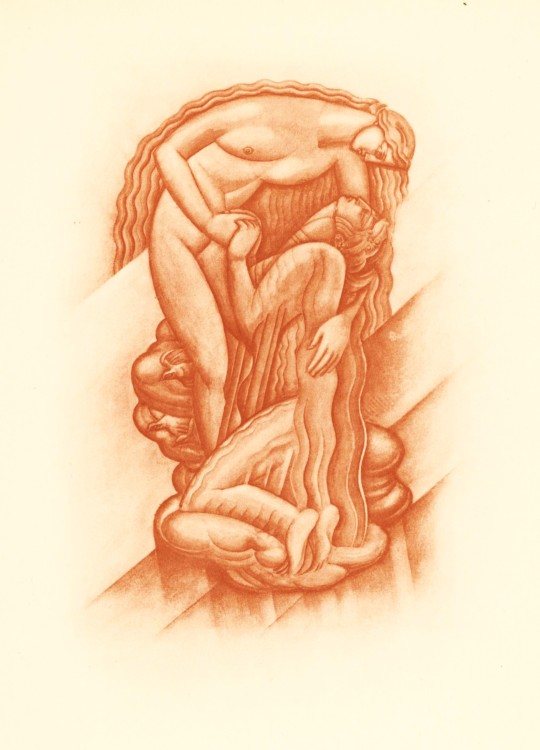
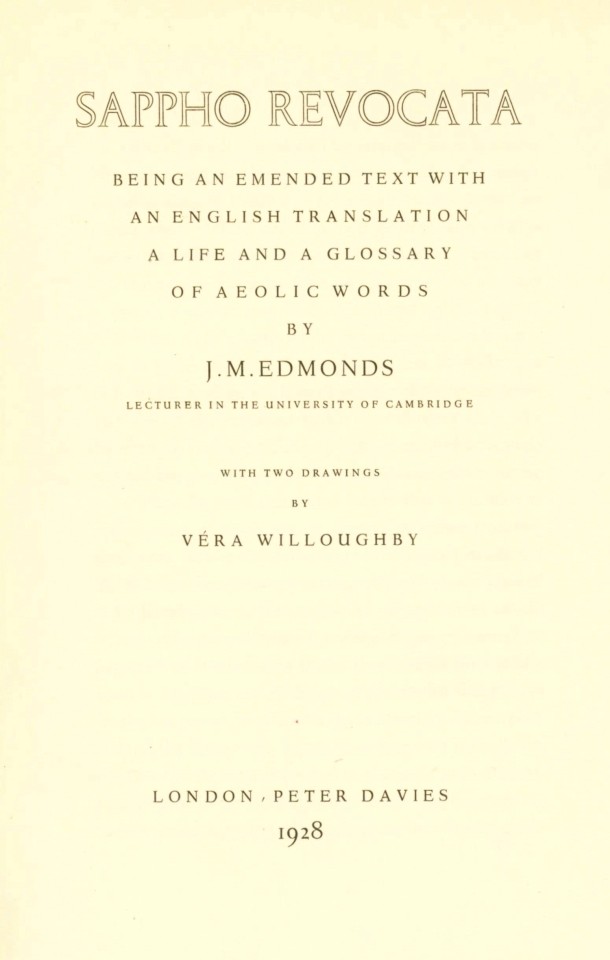
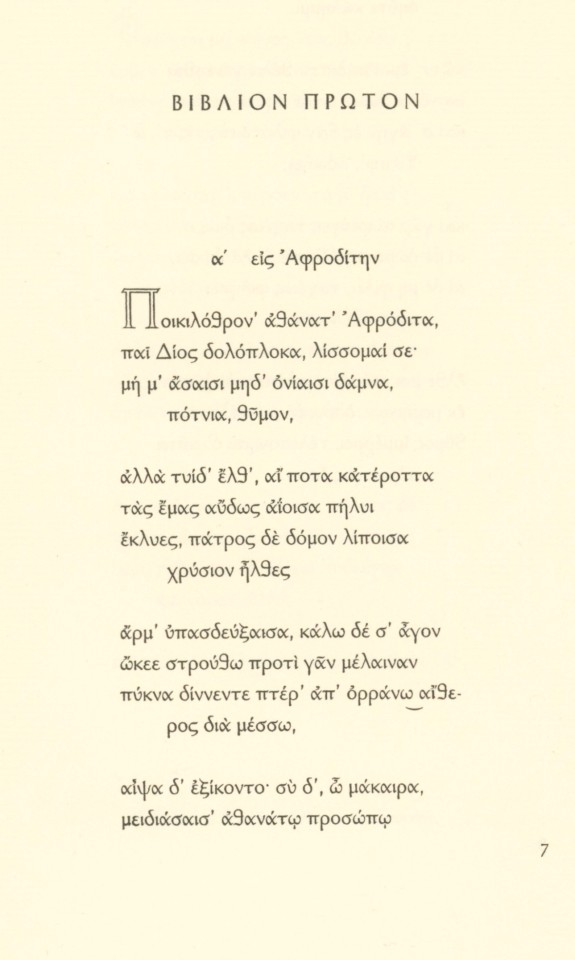
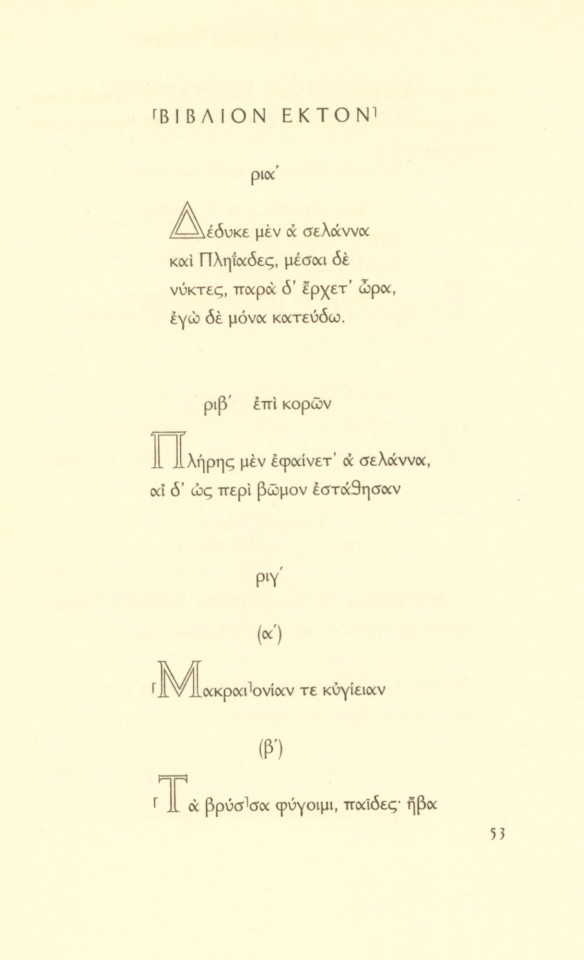


It's Fine Press Friday!
On this Fine Press Friday we present a collection of poems by Sappho entitled Sappho Revocata, compiled and translated by poet, English classicist, and Cambridge lecturer J.M. Edmonds with two drawings printed in collotype by British artist Véra Willoughby, and published in 1928 by Peter Davies in an edition of 350 copies.
Sappho Revocata includes Sappho’s complete and fragmentary poems in two sections; the first half records her poetry in Greek, while the second half has the corresponding English versions of the same works. Sappho is particularly lauded in popular culture for her frequent discussion of romantic love between women. Her poetry was so admired in the ancient world that Plato referred to her as “the tenth muse” in his writings.
This book is the first to use Jan van Krimpen’s Greek type Antigone, with his Lutetia type for the preliminary pages and English section of the text. It was printed by the distinguished Dutch printing house of Joh. Enschedé en Zonen in Haarlem, Holland. The two illustrations by Véra Willoughby were printed at the Chiswick Press in London. 150 copies were reserved for the United States and distributed by Random House.
Our copy, another gift from our friend Jerry Buff, bears the bookplate of Joan Whitney. We're not sure who that may be, but we know this copy was acquired in New York, so we're hoping that it belonged to American heiress, art collector, and co-founder and former majority owner of the New York Mets, Joan Whitney Payson (1903-1975).
View more Fine Press Friday Posts.
– Sarah S., Special Collections Graduate Intern
#fine press friday#sappho#poetry#greek#sappho revocata#vera willoughby#j.m. edmonds#peter davies#collotype#Jan van Krimpen#antigone#antigone type#lutetia#lutetia type#Joh. Enschedé en Zonen#joh. enschede#chiswick press#Sarah S.#fine press#fine press books#fine press printing#fine press fridays#Jerry Buff
22 notes
·
View notes
Text
something i think gets dropped a lot in fandom discussions is the category of stories that both operate within a particular moral framework and are uncomfortable with it. there’s probably a word for this and i’m not articulating this super well but.
i think modern western storytelling, particularly the kind of stories that attract fandom type interactions, either have a morality system that the narrative wholeheartedly agrees with and has set up as “good,” which is being challenged by an outside ��evil” (think lotr) or the system is framed as immoral, and our heroes see through that and overthrow the system to establish a reign of “good,” (start wars, original flavor).
And there are other kinds of storytelling around systems of morality. in western lit/media, they usually belong to more serious, high-brow works that don’t work well with fandom. but the kind of framework i’m talking about is one that also shows up in antigone. in that, there is a set way that Creon has to act, as a good ruler. If he doesn’t act this way, he isn’t a good ruler. And there’s a set way that Antigone has to act to be a good sister. And those two goals are at deep odds, so you wind up with Creon doing the right thing but also doing something so deeply wrong, and Antigone doing the wrong thing to do what’s right. And there’s a read here that’s like. Creon was sticking too closely to the letter of the law and therefore couldn’t see what was really right, like Antigone did, and so is a tragic villain. But you can also read them as both being right, and being unable to resolve that.
And in discussions of mdzs/cql, I feel like I see a lot of either people deciding that society and its moral requirements are bad, and the protagonist who rebels against them is good, OR people upholding the societal moral requirements against the protagonist in a way even the story doesn’t. Because what Wei Wuxian does in leaving the Jiang sect and breaking his promise is wrong for the society of the story. But it’s also true that he’s doing the right thing by protecting the Wens, and the problems with his brother are that they can’t resolve the issue of them both being right in incompatible ways.
And like. Taking revenge for your family by killing the entire family of the people who wronged you is socially acceptable, but I don’t think you can say that the story is happy about it. Being a good and obedient child is a social moral requirement, and the story isn’t framing telling your parents who suck to go fuck themselves, or having them fucked to death, as good. Instead it’s wrestling with the question of what happens when your parents abuse that loyalty and affection, or don’t accept it? What the fuck are you supposed to do when you have to both can’t inter a traitor in the city but you have to bury your family honorably? And there isn’t a neat answer!
Like... Wei Wuxian does owe the Jiangs, and also the handling of that debt is disastrous and unfair to everyone. Jin Guangyao is being a very good son, and therefore a very bad man, until he becomes a terrible son and then a good man (as in once he’s out from under his father, he chooses to do things that enhance the common good for no benefit to himself, and puts a stop to the demonic cultivation experiments that used live people, and generally seems to perform the role of a wise and good leader. I’m not saying what he did to his father or the sex workers was good because it wasn’t, though it is fun narratively). Wen Ning is a traitor to the man who took him in and raised him and to his sect, and he’s also a member of that sect with a potential moral obligation to take revenge, and he did the right thing by helping the Jiangs out. But it was also very much the wrong thing.
And so much of this push and pull and discomfort with, but not rejection of, this moral system is bound up in conflicting moral obligations, to parents, to individuals, to sects, to leaders, and what happens when they conflict. But it’s important, I think, that it’s not actually a rejection of these obligations and their weight. Yeah.
500 notes
·
View notes
Text
Most Tragic Character Tournament: Blog Map
THE RESULTS ARE IN.

FULL COMPETITION BRACKET:


[The winner of each bracket will go head-to-head in the finals. If you see multiples of the same name, it’s because several characters share it, such as Orpheus or c!Scott.]
A Note on the Definition of “Tragic”:

TAGS:
#polls - All polls made by and run on this blog.
#most tragic preliminaries - Tag for the preliminary round of polls.
#most tragic round 1 - Tag for the 1st full round of polls.
#most tragic round 2 - Tag for the 2nd full round of polls.
#most tragic round 3 - Tag for the 3rd full round of polls.
#most tragic round 4 - Tag for the 4th full round of polls.
#most tragic round 5 - Tag for the 5th full round of polls.
#most tragic round 6 - Tag for the full quarterfinal round of polls.
#most tragic round 7 - Tag for the full semifinal round of polls.
#most tragic round 8 - Tag for the final round/poll.
#propaganda - All additional propaganda I’ve received through Asks.
#antigone & #lloyd garmadon - For all your Tragedyshipping heart’s desires.
#asks - All answered questions.
#important - Any type of post (mostly asks) which contain info that I would consider important to the competition, such as announcements, rules explanations, and others questions you may have that I’ve already answered.
#most tragic tournament - Mostly everything within in #important, with a few things not big enough for the latter tag but still relevant to the competition.
#other polls - Other polls and brackets that aren’t this blog.
“Do you think God stays in heaven because he, too, fears what he’s created?”
205 notes
·
View notes
Text


'When I hear actors talking about range, it's not something I necessarily relate to' (Getty)
Definitely SH and Tobias are 2 different types of actors, Tobias is an excellent brave actor and a character actor.

When SH was cast in the series in 2014, the actor’s contract stated he would be comfortable performing nude. While the Starz drama’s leading man agreed to the show’s nude scenes when he first signed up, SH admitted in his memoir that he felt "betrayed" when the producers tried to push the limits of his contract.
Also, SH mentioned he pressed for an intimacy coordinator. But, at that time SH and CB were unknown actors they did not influence in Season 2 as they had post-season 5 and intimacy coordinator is a relatively new thing yet not in 2014-2015.

Menzies as Uncle Chris – whom one might equate to Sophocles’s Creon – in rehearsals for ‘The Other Place’ (National Theatre/Sarah Lee)

Menzies, as a frustrated Prince Philip in ‘The Crown’, says he has empathy for actors who had to defend the show in its later seasons (Netflix)

With Caitriona Balfe and Sam Heughan in ‘Outlander' – Menzies notes that the time-travel show, which is massively popular around the world, hasn’t ‘really meaningfully landed in this country’ (Starz)

Aisling Bea and Menzies in ‘This Way Up’, which ended suddenly on a cliffhanger after two seasons (Channel 4)
Posted 7th October 2024

20 notes
·
View notes
Text
Greek Mythology Characters And Their MBTI Types
Note: I tried to include as many gods, demigods, mortals, creatures etc. as possible.
INTJ: Introverted Intuition (Ni), Extraverted Thinking (Te), Introverted Feeling (Fi), and Extraverted Sensing (Se);
Characters: Athena, Hades, Nyx, Diomedes, Nemesis, Moirai (The Fates), Minos, Ixion, Tantalus, Melinoe, Styx, Graeae, Erebus, Hydra;
INTP: Introverted Thinking (Ti), Extraverted Intuition (Ne), Introverted Sensing (Si), Extraverted Feeling (Fe);
Characters: Pandora, Scylla, Daedalus, Chaos, Urania, Sphinx, Coeus, Aergia;
ENTJ: Extraverted Thinking (Te), Introverted Intuition (Ni), Extraverted Sensing (Se), Introverted Feeling (Fi);
Characters: Zeus, Helios, Medea, Clytemnestra, Ouranos, Eteocles, Charybdis, Hyperion, Moros, Stheno, Nereus, Perses, Caucasian Eagle;
ENTP: Extraverted Intuition (Ne), Introverted Thinking (Ti), Extraverted Feeling (Fe), Introverted Sensing (Si);
Characters: Hermes, Odysseus, Prometheus, Oedipus, Sisyphus, Chimera, Eris, Atë, Enyo, Damocles, Proteus, Momus, Apate, Niobe, Hermaphroditus, Hippomenes;
INFJ: Introverted Intuition (Ni), Extraverted Feeling (Fe), Introverted Thinking (Ti), Extraverted Sensing (Se);
Characters: Hestia, Hecate, Psyche, Circe, Oizys, Chione, Medusa, Cassandra, Iphigenia, Selene, Asclepcius, Chiron, Okeanos, Aether, Theia, Harmonia, Phoebe, Asteria, Astraeus, Alcmene, Callisto, Geryon and Orthus;
INFP: Introverted Feeling (Fi), Extraverted Intuition (Ne), Introverted Sensing (Si), Extraverted Thinking (Te);
Characters: Persephone, Hypnos, Morpheus, Orpheus, Eurydice, Pygmalion, Antigone, Amphion, Plutus, Ariadne, Zephyrus, Euterpe, Hemera, Lethe, Bellerophon, Melpomene;
ENFJ: Extraverted Feeling (Fe), Introverted Intuition (Ni), Extraverted Sensing (Se), Introverted Thinking (Ti);
Characters: Apollo, Gaia, Atlas, Aeneas, Nike, Peitho, Peleus, Admetus, Calliope, Cadmus, Iasion;
ENFP: Extraverted Intuition (Ne), Introverted Feeling (Fi), Extraverted Thinking (Te), Introverted Sensing (Si);
Characters: Dionysus, Eos, Icarus, Thalia, Ganymede, Polynices, Tyche, Philomela, Aglaea, Euphrosyne, Phaethon, Io, Iolaus, Clymene, Amphitryton;
ISTJ: Introverted Sensing (Si), Extraverted Thinking (Te), Introverted Feeling (Fi), Extraverted Intuition (Ne);
Characters: Thanatos, Penelope, Electra, Clio, Echidna, Charon, Argus, Adrastea, Geras, Glaucus;
ISFJ: Introverted Sensing (Si), Extraverted Feeling (Fe), Introverted Thinking (Ti), Extraverted Intuition (Ne);
Characters: Demeter, Patroclus, Cyparissus, Telemachus, Ismene, Leto, Mnemosyne, Macaria, Polymnia, Leda, Thetis, Amphitrite, Maia, Euryale, Amalthea, Merope;
ESTJ: Extraverted Thinking (Te), Introverted Sensing (Si), Extraverted Intuition (Ne), Introverted Feeling (Fi)
Characters: Hera, Poseidon, Cronus, Creon, Cerberus, Agamemnon, Menelaus, Zelus, Themis, Pentheus, Boreas, Zethus;
ESFJ: Extraverted Feeling (Fe), Introverted Sensing (Si), Extraverted Intuition (Ne), Introverted Thinking (Ti);
Characters: Hector, Perseus, Echo, Erato, Rhea, Eileithya;
ISTP: Introverted Thinking (Ti), Extraverted Sensing (Se), Introverted Intuition (Ni), Extraverted Feeling (Fe);
Characters: Artemis, Hephaestus, Polyphemus, Typhon, Pontus, Tartarus, Keres, Lycaon, Zagreus, Erychthonius;
ISFP: Introverted Feeling (Fi), Extraverted Sensing (Se), Introverted Intuition (Ni), Extraverted Thinking (Te);
Characters: Narcissus, Achilles, Helen of Troy, Eros, Hebe, Andromeda, Iris, Orestes, Adonis, Triton, Endymion, Danae, Hyacinthus, Daphne;
ESTP: Extraverted Sensing (Se), Introverted Thinking (Ti), Extraverted Feeling (Fe), Introverted Intuition (Ni);
Characters: Ares, Pan, Heracles, Kratos, Midas, Theseus, Ajax the Greater, Jason, Orion, Iapetus, Priapus, Tityos, Pelops;
ESFP: Extraverted Sensing (Se), Introverted Feeling (Fi), Extraverted Thinking (Te), Introverted Intuition (Ni);
Characters: Aphrodite, Paris, Calypso, Epimetheus, Terpisichore, Atalanta, Hedone, Hyppolita, Lamia, Achelous;
#greek gods#greek mythology#mbti types#mbti personalities#mbti personality types#zeus#hera#poseidon#hades#demeter#hestia#athena#ares#hephaestus#aphrodite#apollo#artemis#hermes#dionysus#persephone#heracles#perseus and andromeda#theseus
44 notes
·
View notes
Text
My fav roles of CE so far
1. & 2. Nine (DW) or Matt (the Leftovers)
It's difficult to say. I think Nine is a character made to be likable. Personally I love a flawed character so Matt is more to my preferences, but Nine is still a special character to me. The only issue is that I am not into the Doctor and Doctor Who as a whole, so the character arc was incomplete. Meanwhile Matt's character arc was as perfect as it could get for a supporting character.
3. Maurice (the A Word)
He was CUTE, OK???? Anyway I enjoyed CE's performance of a flawed masculine person. I also really enjoyed it when he played comedy. I think Maurice is the hottest character he played because I wanna bully him 🗿.
4. Nicky (OFITN)
I LOVE NICKY. I ADORE HIM SO MUCH.
5. Jude
I just wanna see him happy 🗿🗿🗿 (I have a lot of thoughts after finishing Jude but it's depressing)
Honorable mention
- Vindici (Revengers Tragedy)
What I liked the most about him was how much fun he's having with revenge lol. It's interesting to see CE in this type of role.
- Joe (Flesh and Blood)
I don't think he's a likable character but I think it's a beautiful performance. He feels like a real person rather than a character.
- Duke of Norfuck (Elizabeth) and Aspinall (Lucan)
Bland characters but fun to watch CE's performance. I might like Aspinall a bit more than Norfuck.
- Creon (Antigone)
HOT but I can't tell yet because I've not finished it lol. He seems like my type though 😂
#christopher eccleston#the ranking might change based on total vibe of that day#the ranking is more of how much they made me think about them as a character#like how much they made me want to analyze them afterwards
11 notes
·
View notes